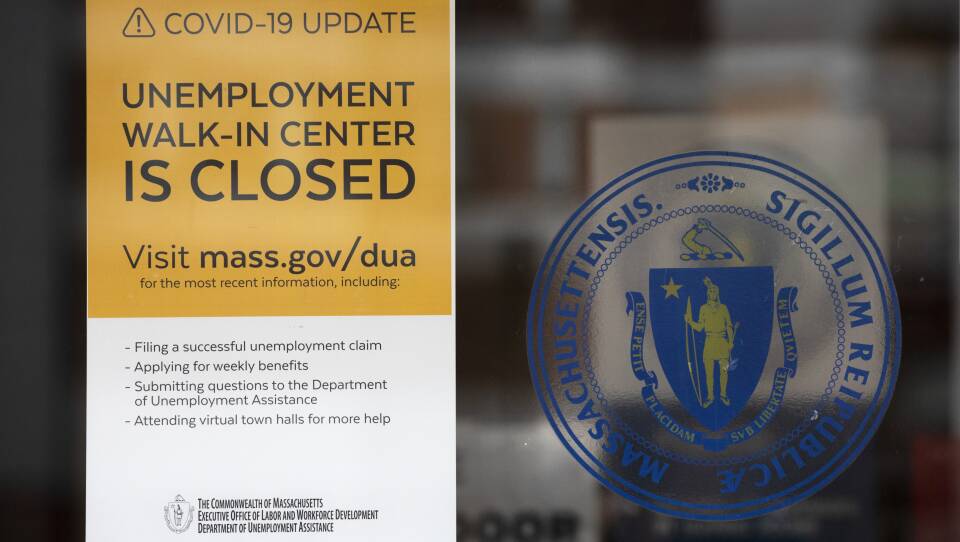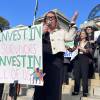The group that has spent the last year studying potential reforms to keep the state's unemployment system solvent in the long-term is poised to make just two formal recommendations: that the goal be to reach the federal government's recommended target balance and that state labor officials do more to promote a program that allows workers to collect partial unemployment benefits to replace some wages lost through reduced hours.
Over the course of more than two hours Tuesday, divisions among the 21-member Unemployment Insurance Trust Fund Study Commission were highlighted as the Democratic lawmakers and organized labor officials on the panel were largely unable to sway business groups to support their proposed reforms.
The state's unemployment insurance trust fund was overwhelmed by the unprecedented surge in joblessness during the early months of the COVID-19 pandemic, forcing the state to turn to federal loans to keep benefits flowing. An independent assessment of the fund, conducted for the state by KPMG and released earlier this year, estimated the fund's balance as of Nov. 30 at $2.94 billion but highlighted three issues -- federal loan obligations, outstanding employer credits, and a reimbursement due to the federal government -- that collectively push the fund into a $115 million structural deficit.
There was so little agreement among commission members that the chairs' plan to accept minutes from Tuesday's meeting as it ended so that the commission's work would be completed was rebuffed. Instead, the group will meet once more — after a layoff of at least two weeks so as to not conflict with the Senate's budget debate — to adopt minutes and formally end its work.
"We made these recommendations with the hope of achieving agreement, which would mean that not everybody would agree with every portion but they would try to come to consensus," Sen. Patricia Jehlen, a commission co-chair, said during discussion on one particular recommendation. She added, "So I'm just saying that if people want to have all of their concerns addressed, I hope they will consider the concerns of other members with other interests."
When the group met for its 11th meeting Tuesday morning, the group's co-chairs had proposed seven draft recommendations to be included in the commission's final report. But right off the bat, Rep. Josh Cutler and Jehlen announced that they were no longer suggesting the group adopt language suggesting a study of portable benefits for gig economy workers.
Things didn't go much better for the co-chairs' other recommendations.
After dispatching a small handful of amendments -- the commission approved of a suggestion from Black Economic Council of Massachusetts' designee Shanikwa Davis and rejected a few amendments from Retailers Association of Massachusetts President Jon Hurst -- Cutler called for a vote on the whole slate of the chairs' six remaining recommendations.
Ten commission members voted to recommend the entire suite, but nine voted against making the recommendations. Though the package won the support of a simple majority of voting commission members (Labor and Workforce Development Secretary Rosalin Acosta and Department of Unemployment Assistance Director Richard Jeffers both abstained) it did not meet the two-thirds threshold that Cutler said the commission had established as its bar.
The commission voted exactly the same when Cutler and Jehlen put forward just their first two recommendations — to adjust and then index the wage base that is used to set unemployment insurance rates and to reduce the experience rate table over time to allow for moderate, manageable and predictable revenue growth.
"These two recommendations alone, if implemented adequately, gradually and predictably, would bring us to solvency," Jehlen said.
The 10 members who voted in favor of the recommendation were: Cutler, Jehlen, Evan Horowitz of the Tufts Center for State Policy Analysis, John Drinkwater from AFL-CIO, Richard Marlin from Mass Building Trades Council, CapeWind CEO and former Sen. Dan Wolf, Davis, Hannah Tanabe from Greater Boston Legal Services, Stephanie Herron Rice from the Justice Center of Southeast Massachusetts, and Daina Estime from the Union of Minority Neighborhoods.
The nine members who voted against the recommendation were: Hurst, Chris Carlozzi of the National Federation of Independent Business, Kelsey Cintolo of the Mass Competitive Partnership, Steve Clark from the MA Restaurant Association, Brooke Thomson from Associated Industries of Massachusetts, Eileen McAnneny of the Mass Taxpayers Foundation, Christopher Anderson from the MA High Technology Council, Karen Andreas from the North Shore Chamber of Commerce, and Carolyn Ryan from the Greater Boston Chamber of Commerce.
Hurst had proposed that the wage base only be adjusted once the cost of any borrowing to support the fund is paid in full and discussion on his proposed amendment sparked a back-and-forth between commission members who found themselves on opposite sides of the vote on the recommendation.
"I continue to feel that a lot of the discussion is based on a kind of misapprehension about what raising the taxable wage base does. It doesn't increase taxes. So the idea that we should hold off on this burden until the bonding is done doesn't have a rational basis because it's not an additional burden. It's a shift in who's paying but not necessarily an increase in taxes, at least in my estimation," Horowitz said.
Carlozzi responded that he thinks it would represent a tax increase for some businesses during a time of high inflation and growing wages.
"I do think that an increase in the taxable wage base does translate into a tax increase for a lot of these businesses at this point. And it would be coupled with additional assessments as part of that. So it would be an overall cost increase. I guess we can call it what we want, a fee, an assessment or a tax increase, but the overall cost will go up for businesses based on wages as well as some of these fees and assessments," he said.
Horowitz asserted that what Carlozzi stated was "not true" and attempted to illustrate his point.
"If you had $100 and I say you have to pay taxes on the first $10 at a rate of 10 percent, then you owe $1. If I say you have to pay taxes on the first $20 at a rate of 2.5 percent, you still owe $1," he said. "I've raised the taxable wage base from $10 to $20, but I've adjusted rates. There's no increase in your tax burden or your fees or anything."
Carolyn Ryan, senior vice president of policy and research for the Greater Boston Chamber of Commerce, stepped in to mediate but also voiced her own concerns with the suite of proposals that Jehlen and Cutler recommended.
"I think the issue of it is not everybody has the same $100 in this case. So for some companies that will be an increase and others it might be steady level or a reduction. But depending on what your wage levels are, you could see, I think, an increase," she said. "From my perspective, I think true of both this recommendation and others, there's not a lot of parameters around what's proposed and that gives me some pause ... in general, I have some trepidation about the lack of details."
The only recommendation that at least two-thirds of the commission could agree to Tuesday was that the Executive Office of Labor and Workforce Development "should create a strategy to promote and expedite applications in the WorkShare Program to industries that would benefit from the program."
"The WorkShare program is underutilized because it is not a well-known program. It helps to keep a business open and running while also allowing employees to be paid when their hours are reduced, while also reducing the burden on the unemployment trust fund," Cutler said.
That recommendation was adopted with 13 members in favor, four opposed (Thomson, McAnneny, Anderson and Andreas) and three abstaining (Davis, Carolozzi and Cintolo).
"So kumbaya, that reached the two-thirds threshold. So I knew there was something that could bring us together, it was WorkShare," Cutler said.
Jehlen said that the commission voted unanimously in November to adopt the recommendation that the goal of the trust fund is to achieve a high-cost multiple of 1.0 over time, which mirrors the U.S. Department of Labor's solvency target recommendation.







